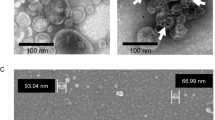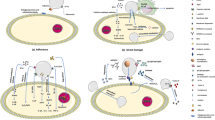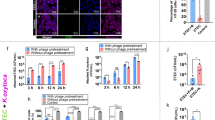Abstract.
Moraxella catarrhalis is an important pathogen of respiratory and middle ear infections. We previously reported that the attachment of M. catarrhalis to pharyngeal epithelial cells is mediated by ganglioside M2 (GM2). Several sets of adhesins or receptors are involved in such attachment process. In this study, we used the same strains and similar bacterial culture conditions as those in our previous study, and demonstrated by thin layer chromatography that M. catarrhalis can also bind to asialo-GM1 (Gg4Cer) and asialo-GM2 (Gg3Cer). GalNAcβ1→4Galβ1 is a common sequence in both Gg4Cer and Gg3Cer, and in many respiratory bacteria, this sequence acts as a receptor for attachment to host cells. Treatment of human pharyngeal epithelial cells with anti-GM2 and anti-Gg4Cer antibodies significantly decreased attachment of M. catarrhalis to these cells; however, treatment with anti-Gg3Cer antibody did not decrease M. catarrhalis attachment. Immunofluorescence microscopy revealed that human pharyngeal epithelial cells are positive for GM2 and Gg4Cer, but not for Gg3Cer. Our results indicate that Gg4Cer on human pharyngeal epithelial cells, and Gg3Cer, possibly on other cells, could serve as molecules for attachment of M. catarrhalis.
Similar content being viewed by others
Author information
Authors and Affiliations
Additional information
Electronic Publication
Rights and permissions
About this article
Cite this article
Ahmed, K., Suzuki, Y., Miyamoto, D. et al. Asialo-GM1 and asialo-GM2 are putative adhesion molecules for Moraxella catarrhalis . Med Microbiol Immunol 191, 5–10 (2002). https://doi.org/10.1007/s00430-002-0109-2
Received:
Issue Date:
DOI: https://doi.org/10.1007/s00430-002-0109-2




